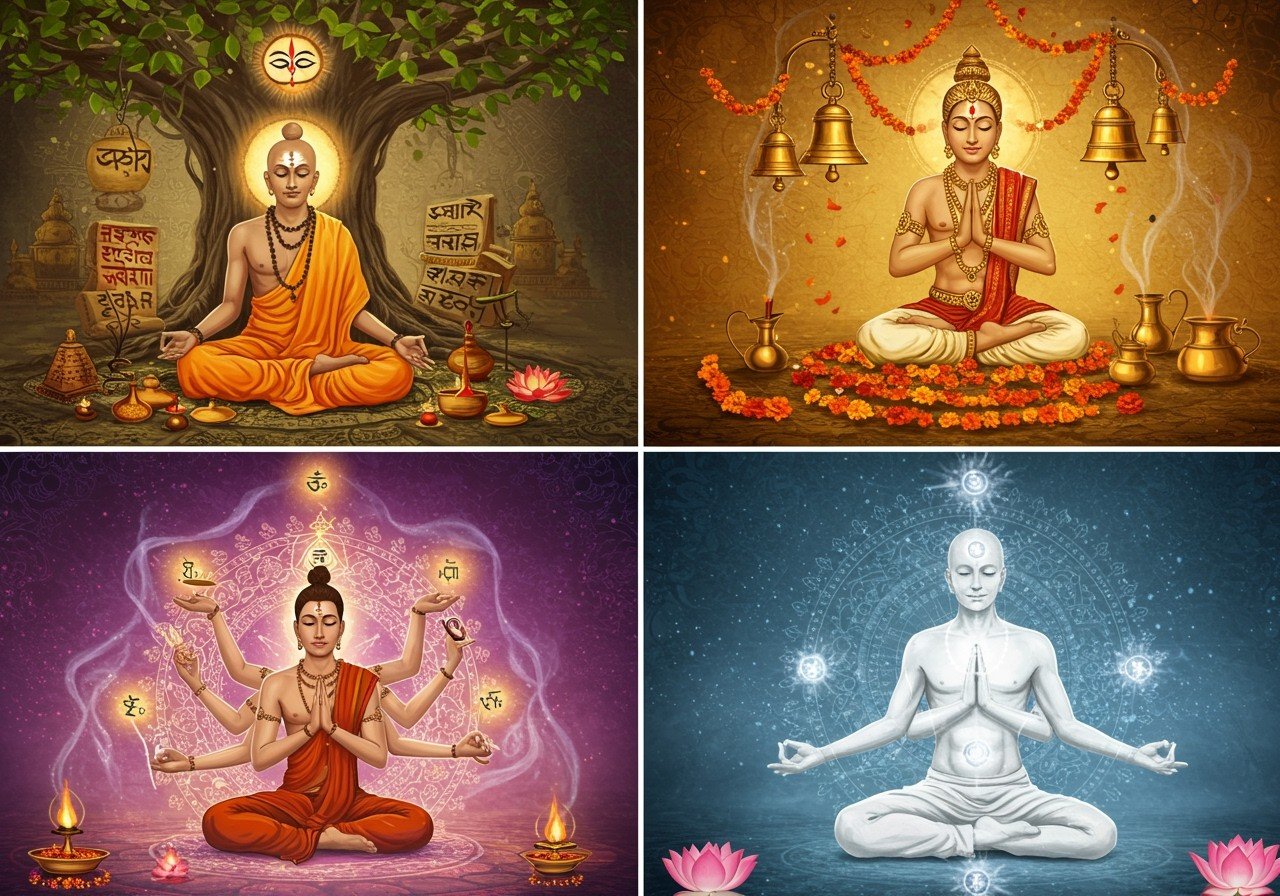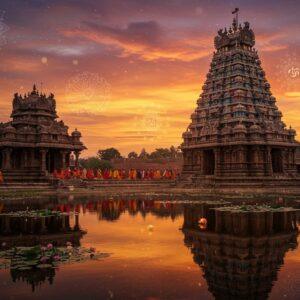Exploring the Paths to Enlightenment: Jnana, Bhakti, Karma, and Raja Yoga

Yoga, a cornerstone of ancient Indian tradition, offers diverse avenues for spiritual growth and enlightenment. These paths, including Jnana Yoga, Bhakti Yoga, Karma Yoga, and Raja Yoga, each provide a unique approach, remaining remarkably relevant even in contemporary times. By understanding these distinct paths, we can bridge tradition with modern life, empowering individuals to choose the path that resonates most deeply with their personal spiritual journey. You can learn more about related topics by exploring the significance of Rudraksha and Tulsi and Yantras and Yagyas on the poojn.in blog.
Understanding Jnana Yoga – The Path of Knowledge
Jnana Yoga, the path of knowledge, emphasizes self-realization through wisdom and profound understanding. Practitioners delve into self-inquiry and meditative practices to discern their true self (Atman) from the constructs of the ego. The concept of ‘Neti Neti’ (not this, not that) serves as a tool for dismantling false identities and attachments. The Guru-shishya tradition (teacher-student relationship) holds immense importance, guiding seekers towards higher knowledge and wisdom. Jnana Yoga finds its roots in ancient texts like the Upanishads and the Bhagavad Gita, requiring dedicated intellectual engagement to penetrate illusions and grasp the nature of reality. For a more in-depth look at Hindu scriptures, visit this page on poojn.in.
Comparing the Paths to Enlightenment
Jnana Yoga vs. Bhakti Yoga – Wisdom vs. Devotion
Jnana Yoga, the path of wisdom, centers on self-realization through knowledge and introspective meditation. Bhakti Yoga, conversely, emphasizes love and devotion directed towards a personal deity. These can be seen as two distinct paths leading to the same ultimate destination. Jnana Yoga encourages introspection, urging practitioners to explore the depths of their being and the nature of reality. They seek enlightenment by distinguishing between the true self (Atman) and the ego, often employing meditation and the ‘Neti Neti’ method to break free from false identifications. The Guru-shishya tradition plays a vital role, with a teacher guiding the student on this intellectual and spiritual journey.
Bhakti Yoga, in contrast, expresses devotion outwardly through practices like singing, chanting, and prayer, fostering a deep emotional bond with the divine. This path encourages surrender to a higher power, allowing love and devotion to transcend the ego. Figures like Mirabai and Tulsidas exemplify the power of unwavering devotion.
While Jnana Yoga often takes an individualistic approach focused on self-inquiry, Bhakti Yoga thrives within communal settings. Temples and gatherings provide spaces for shared devotion and collective worship. Ultimately, both paths share the same aim: dissolving the ego to achieve self-realization. These paths can beautifully complement each other. The knowledge acquired through Jnana Yoga can deepen the devotion practiced in Bhakti Yoga, and the love experienced in Bhakti can enhance the understanding sought in Jnana. This synergy creates a holistic approach to spiritual evolution.
Jnana Yoga vs. Karma Yoga – Wisdom vs. Action
Karma Yoga distinguishes itself as the path of selfless action, emphasizing dedicated work without attachment to outcomes. This stands in contrast to Jnana Yoga’s focus on wisdom and contemplation. Karma Yoga encourages performing duties without seeking rewards, a practice known as ‘Nishkama Karma,’ aligned with the teachings of the Bhagavad Gita. It’s about serving others with love, embodying the principle that selfless action is a pathway to liberation. Figures like Mahatma Gandhi exemplified these principles in their lives. For guidance on your spiritual journey, explore Finding Your Guru on poojn.in.
Jnana Yoga seeks to detach from ignorance through knowledge, while Karma Yoga promotes detachment from the fruits of actions. Jnana Yoga requires deep introspection, while Karma Yoga calls for active participation in life. However, they share a common thread: detachment from worldly desires. Karma Yoga provides a practical application of insights gained through Jnana Yoga. Integrating these paths allows for a balanced life, harmonizing thought and action.
Jnana Yoga vs. Raja Yoga – Wisdom vs. Mental Control
Raja Yoga is known as the path of meditation and mental discipline. Patanjali’s Yoga Sutras outline the eightfold path, or ‘Ashtanga,’ guiding practitioners through Yama (ethical restraints), Niyama (observances), Asana (physical postures), Pranayama (breath control), Pratyahara (withdrawal of senses), Dharana (concentration), Dhyana (meditation), and Samadhi (absorption). Raja Yoga complements Jnana Yoga by offering tools to deepen philosophical inquiry. Both paths ultimately aim for self-realization, transcending the ego to connect with the divine. Explore meditation and mantra practices on the poojn.in blog. Explore relevant products like meditation asans and mala beads on poojn.in.
Integrating the Yogic Paths – A Holistic Approach
The beauty of these yogic paths lies in their adaptability. Individuals can integrate Jnana, Bhakti, Karma, and Raja Yoga to craft a balanced spiritual practice. This integration allows individuals to draw from multiple sources according to their temperament and life circumstances. Modern teachers often advocate for a ‘yoga of synthesis,’ embracing all paths for holistic development. Spiritual figures often embody elements of all four paths, showcasing their complementary nature. Each path holds unique treasures for personal growth. Exploring these paths can lead to profound transformation and a deeper understanding of oneself and the universe.
Poojn.in: Supporting Your Spiritual Journey
Poojn.in offers a wide selection of products to support your practice, whether you’re drawn to Jnana Yoga’s intellectual exploration, Bhakti Yoga’s devotional practices, Karma Yoga’s selfless service, or Raja Yoga’s meditative focus. From sacred texts and puja items to meditation cushions and yoga accessories, poojn.in provides authentic and high-quality products to enhance your spiritual journey. Discover more at poojn.in.
Embracing the Yogic Journey – A Path to Inner Peace
In the yogic journey, each path offers its own unique wisdom and beauty. By understanding and integrating these paths, we honor ancient traditions while embracing a holistic approach to spiritual growth. As we navigate this path, let’s remember that each step, guided by ancient wisdom, brings us closer to inner peace and universal understanding.


